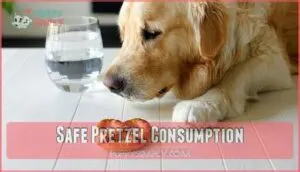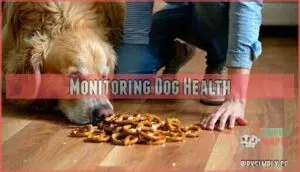This site is supported by our readers. We may earn a commission, at no cost to you, if you purchase through links.

These salty snacks pack way too much sodium for your pup’s system and can trigger dangerous salt poisoning.
Even a small pretzel contains several times your dog’s daily sodium limit, leading to excessive thirst, vomiting, and potentially life-threatening kidney problems.
Many pretzels also contain xylitol, an artificial sweetener that’s toxic to dogs.
If your furry friend snatches one, don’t panic, but watch for warning signs like lethargy or unusual behavior.
Your dog’s begging eyes might be hard to resist, but there are safer ways to show your love.
Table Of Contents
- Key Takeaways
- Can Dogs Eat Pretzels
- Are Pretzels Bad for Dogs
- Pretzel Consumption Guidelines
- Pretzel Health Risks for Dogs
- What to Do if Dog Eats Pretzels
- Safe Alternatives to Pretzels
- Frequently Asked Questions (FAQs)
- What happens if my dog eats pretzels?
- Are pretzels a good snack for dogs?
- How much salt is in pretzels?
- Are any pretzels safe for dogs to eat?
- Are there any alternative snacks for dogs instead of pretzels?
- Is there a safe way to feed pretzels to dogs?
- Can puppies eat pretzels safely?
- Are homemade pretzels safer than store-bought?
- How much pretzel causes salt poisoning?
- Do different dog breeds react differently?
- Conclusion
Key Takeaways
- Never feed your dog pretzels – they’re loaded with dangerous salt levels that can cause poisoning, dehydration, and potentially life-threatening kidney problems, especially in smaller breeds.
- Watch for toxic ingredients – many pretzels contain xylitol (artificial sweetener), garlic powder, or onion seasoning that are poisonous to dogs and can trigger serious reactions.
- Act quickly if your dog eats pretzels – monitor for symptoms like excessive thirst, vomiting, lethargy, or seizures, and contact your vet immediately if any warning signs appear.
- Choose safer alternatives – give your dog healthy treats like carrots, apple slices, or dog-specific snacks instead of sharing your salty human food that offers zero nutritional value for pets.
Can Dogs Eat Pretzels
You might wonder if it’s safe to share your salty snack when your dog gives you those irresistible puppy eyes at snack time.
While pretzels aren’t toxic to dogs, they’re loaded with salt and carbs that can cause serious health problems, especially for smaller breeds.
Pretzel Toxicity Risks
Anyone considering sharing pretzels with their dog should understand the real toxicity risks involved.
While pretzels aren’t inherently poisonous, they pose serious health threats that can escalate quickly.
The main dog pretzel toxicity concerns include:
- Salt poisoning from excessive sodium content
- Xylitol dangers in sweet or flavored varieties
- Dehydration risks leading to kidney failure and heart disease.
Are pretzels safe for dogs? The answer isn’t straightforward.
Health Risks for Dogs
Beyond toxicity concerns, pretzels pose serious health risks for dogs.
The high sodium content can trigger salt poisoning, leading to digestive upset and dehydration. More alarming, regular consumption may contribute to heart disease and kidney failure over time.
| Health Risk | Potential Outcome |
|---|---|
| Salt toxicity | Vomiting, lethargy, seizures |
| Xylitol danger | Hypoglycemia, liver damage |
| Excessive sodium | Heart disease, kidney failure |
Salt Content Dangers
Salt in pretzels can spell serious trouble for your dog’s health.
Even a few salty pretzels can push your pup toward dangerous salt poisoning—water becomes their lifeline.
High sodium levels trigger dehydration risks and potentially fatal sodium toxicity.
Small breeds face even greater danger due to their size.
Excessive salt intake strains your dog’s kidneys, potentially causing kidney damage and heart problems.
Even a few salty pretzels can push dogs toward salt poisoning, making water their lifeline.
Are Pretzels Bad for Dogs
Despite their crunchy appeal, pretzels pose several health risks for your furry friend.
The high salt content in most pretzels creates immediate concerns about salt toxicity, especially dangerous for smaller breeds who process sodium differently.
Pretzel ingredients like garlic powder, onion seasoning, or artificial sweeteners can trigger serious reactions in dogs.
Long-term effects of regular pretzel consumption include kidney strain, heart problems, and obesity from excessive carbohydrates.
Some dogs show greater breed susceptibility to these issues, particularly toy breeds and senior dogs.
Even plain pretzels lack nutritional value and can disrupt your dog’s balanced diet.
The simple answer to "can dogs have pretzels" is that while not immediately toxic, pretzels for dogs aren’t worth the dog health risks.
Consider safe alternatives like carrots or apple slices instead.
Proper portion control matters, but honestly, skipping pretzels altogether keeps your pup healthier and happier.
Pretzel Consumption Guidelines
If you’re wondering whether it’s safe to share your favorite snack with your furry friend, the answer isn’t straightforward.
While plain pretzels won’t poison your dog, they’re packed with salt and offer zero nutritional benefits.
Making them a poor choice for regular treats.
Safe Pretzel Consumption
Plain pretzels can be an occasional snack for your dog, but moderation is key.
Stick to one small plain pretzel and make certain water access to help flush excess sodium.
Monitor signs of distress afterward, especially in smaller breeds who show greater breed sensitivity.
Safe pretzels for dogs are unflavored varieties without toppings. Keep serving size minimal always.
Avoiding Toxic Pretzels
While plain pretzels aren’t ideal, you’ll need sharp ingredient awareness to spot truly dangerous varieties.
Reading labels becomes your best defense against harmful ingredients that can trigger severe toxicity.
Three toxic pretzel types to avoid completely:
- Chocolate-covered pretzels – Chocolate contains compounds that cause poisoning in dogs
- Xylitol-sweetened varieties – This artificial sweetener is deadly, even in tiny amounts
- Garlic or onion-flavored – These seasonings damage red blood cells
Keep emergency contacts handy and choose safe alternatives instead.
Monitoring Dog Health
Keeping a watchful eye on your dog’s condition becomes essential after any pretzel incident.
Look for changes in appetite, energy levels, and bathroom habits. Check their hydration by gently pinching skin – it should snap back quickly.
| Vital Signs | Normal Range | Warning Signs |
|---|---|---|
| Appetite Monitoring | Enthusiastic eating | Refusing food, picking at meals |
| Behavior Changes | Playful, alert | Lethargy, confusion, restlessness |
| Hydration Levels | Pink gums, elastic skin | Dry mouth, sunken eyes |
| Bathroom Habits | Regular schedule | Vomiting, diarrhea, straining |
| Preventative Care | Active movement | Weakness, trembling, seizures |
Veterinary Consultation
Call your veterinarian before sharing any pretzels with your dog.
When to consult includes emergency situations like vomiting or lethargy after pretzel consumption. Your vet understands breed predispositions to salt toxicity and can recommend safe treat alternatives.
Veterinary consultation provides personalized advice about what’s toxic versus safe for your dog’s specific health needs and size, considering factors such as salt toxicity.
Pretzel Health Risks for Dogs
While pretzels might seem like harmless snacks, they can pose serious health threats to your furry friend through high salt content, toxic additives, and dangerous sweeteners like xylitol.
You’ll need to understand these risks, from salt poisoning to digestive upset, so you can protect your dog from potentially life-threatening complications.
Salt Poisoning Symptoms
Salt toxicity from pretzels shows clear warning signs you shouldn’t ignore.
Watch for excessive thirst and frequent urination as your dog’s body fights sodium overload. Vomiting and diarrhea often follow, accompanied by lethargy and weakness.
Incoordination signs like stumbling or difficulty walking indicate serious poisoning symptoms.
Seizure risk increases with severe cases, requiring immediate veterinarian attention.
Xylitol Poisoning Symptoms
Several warning signs indicate xylitol toxicity in your dog.
Watch for drooling, disorientation, and pale gums as early symptoms.
More severe poisoning symptoms include bloody stools and jaundice, which signal serious liver damage.
These toxic adverse reactions can escalate quickly, so don’t wait if you spot any combination of these signs after pretzel consumption.
High Sodium Intake Risks
Beyond immediate poisoning concerns, your dog’s body wasn’t designed to handle pretzels’ massive sodium content.
Just like us, dogs can develop serious long-term health issues from too much salt.
Here’s what high sodium intake can trigger:
- Dehydration Risks – Your pup’s body desperately tries to balance salt levels
- Kidney Damage – Overworked kidneys struggle to filter excess sodium
- Heart Problems – High blood pressure strains your dog’s cardiovascular system
- Salt Poisoning – Toxicity leads to potentially fatal complications
What to Do if Dog Eats Pretzels
If your dog snatches a pretzel from your snack bowl, don’t panic, but you’ll need to act quickly to assess the situation.
The steps you take next depend on how many pretzels your pup ate, what type they were, and your dog’s size, so it’s important to stay calm and gather the facts.
Emergency Response
When your dog gobbles up pretzels, don’t panic but act quickly.
Never induce vomiting unless your veterinarian specifically advises it, as this can worsen toxic reactions.
Monitor symptoms like vomiting, diarrhea, or seizures closely.
Contact your veterinarian immediately for guidance on supportive care and preventative measures moving forward.
You may also want to look at a dog vomiting remedy for additional help with dog vomiting.
Veterinary Examination
Once you arrive at the clinic, your veterinarian will conduct thorough diagnostic testing and physical exams to evaluate your dog’s condition.
They’ll assess symptoms like vomiting, lethargy, or excessive thirst that indicate salt poisoning.
The vet will discuss treatment options based on their findings and recommend appropriate follow-up care to monitor your pet’s recovery from toxic foods.
Treatment for Poisoning
Immediate treatment depends on what your dog ate and when.
Your veterinarian might induce vomiting if the pretzel contained xylitol or other toxic ingredients. Don’t try this at home—it can be dangerous.
- Activated charcoal helps absorb remaining toxins in the digestive system
- IV fluids combat dehydration and flush excess sodium from the body
- Supportive care includes monitoring symptoms and maintaining stable essential signs
Preventing Future Ingestion
Once your dog recovers, focus on preventing repeat incidents.
Store pretzels and other salty snacks in secure containers your dog can’t reach.
Educate family members about snack safety and the importance of not sharing human food.
Dog-proofing your kitchen means keeping counters clear and cabinets locked.
Consider these prevention strategies to ensure your dog’s safety and well-being.
| Prevention Method | Implementation | Benefits |
|---|---|---|
| Secure Food Storage | Use airtight containers in high cabinets | Prevents accidental access to harmful snacks |
| Treat Alternatives | Stock dog-safe treats in accessible spots | Satisfies your dog’s craving for crunchy snacks |
| Dog-Proofing Tips | Install cabinet locks and clear counters | Creates a safer environment for curious pets |
| Educate Family | Teach everyone about toxic foods for dogs | Guarantees consistent pet safety practices |
| Leash Training | Practice "leave it" commands during walks |
Prevents dogs from eating dropped food outdoors to maintain their health and safety.
By following these prevention strategies, you can significantly reduce the risk of your dog getting into harmful substances, ensuring a healthy and safe environment for your pet.
Safe Alternatives to Pretzels
You don’t need to worry about finding treats for your dog when so many safe, healthy options exist.
Choose dog-specific snacks, fresh fruits like apple slices, or carrots instead of sharing your salty pretzels, and your furry friend will thank you for it.
Healthy Dog Treats
Instead of risky pretzels, choose healthy dog treats that pack real nutritional value.
Dental chews support oral health while training rewards keep sessions engaging.
Look for limited ingredients options like freeze-dried proteins or homemade recipes using dog-safe fruits and vegetables.
The best dog treats offer omega fatty acids for coat health, and smart dog nutrition tips start with reading ingredient labels carefully.
Low-Sodium Snacks
Looking beyond traditional store-bought options, you’ll find plenty of low-sodium alternatives that won’t trigger salt toxicity concerns.
Homemade dog treats let you control ingredients completely. Try vegetable dog chews like carrots or green beans, fruit-based snacks such as apple slices, or lean protein options like plain chicken.
These dog snack options support better dog nutrition tips than pretzels for dogs ever could. You can find a variety of low sodium options online, which are great healthy alternatives for your pet, providing better nutrition and low sodium intake.
Natural Dog Foods
When choosing treats for your furry friend, organic dog food options provide wholesome nutrition without harmful additives.
Raw food diets and grain-free options work well for dogs with sensitivities.
Limited ingredient diets help identify allergens, while homemade dog food lets you control every ingredient.
Many pet owners are now exploring healthier natural options for their beloved companions, supporting better dog nutrition, health, and safety than processed human snacks.
Avoiding Human Snacks
The best rule of thumb? Keep human snacks away from your furry friend entirely.
Many everyday foods contain toxic ingredients that spell trouble for dogs. Salt toxicity, chocolate, garlic, and onion powder lurk in countless pantry staples.
Owner education about toxic foods for dogs prevents emergency vet visits. Stick to dog-specific treats and healthier alternatives designed for canine safety instead.
Frequently Asked Questions (FAQs)
What happens if my dog eats pretzels?
Better safe than sorry—if your dog eats pretzels, watch for excessive thirst, vomiting, or lethargy from high salt content.
Plain pretzels won’t poison them, but contact your vet if symptoms appear.
Are pretzels a good snack for dogs?
No, pretzels aren’t a good snack for dogs. They’re loaded with salt that can cause dehydration and toxicity. Skip the pretzels and choose dog-specific treats instead for your pup’s health.
How much salt is in pretzels?
A single pretzel contains roughly 200-400 milligrams of salt, depending on size and brand.
That’s concerning for dogs since they need minimal sodium.
Even one pretzel packs enough salt to cause problems.
Are any pretzels safe for dogs to eat?
Plain, unsalted pretzels contain roughly 95% less sodium than regular varieties.
You can occasionally offer tiny pieces of plain pretzels to healthy dogs, but they’re still high in carbs and provide zero nutritional value for your pup.
Are there any alternative snacks for dogs instead of pretzels?
Choose dog-specific treats like carrot sticks, apple slices, or plain rice cakes instead.
These healthier alternatives satisfy your pup’s craving without the salt and additives that make pretzels risky for their health.
Is there a safe way to feed pretzels to dogs?
Sure, you could hand-feed your pup a single plain pretzel piece—if you enjoy watching them gulp water like a camel.
Stick to tiny, unsalted bits occasionally, ensuring fresh water’s available.
Can puppies eat pretzels safely?
Puppies shouldn’t eat pretzels safely.
Their smaller size makes them more vulnerable to salt poisoning, and their developing digestive systems can’t handle the high sodium content that could cause serious health complications.
Are homemade pretzels safer than store-bought?
Like trading a store-bought suit for a custom-tailored one, homemade pretzels give you control over ingredients.
You can reduce salt and avoid toxic additives, but they’re still not ideal treats for your dog.
How much pretzel causes salt poisoning?
More than 5 grams of salt per pound of your dog’s body weight can be lethal. Even smaller amounts cause serious symptoms like vomiting, diarrhea, and seizures requiring immediate veterinary attention.
Do different dog breeds react differently?
Yes, smaller dog breeds face higher risks from pretzel consumption than larger breeds.
Your tiny Chihuahua or Yorkshire Terrier can’t handle salt like a Golden Retriever can, making them more susceptible to poisoning.
Conclusion
Surprisingly, over 40% of dog poisoning cases involve common household foods like pretzels.
Remember, when asking "can dogs eat pretzels," the answer’s always no.
These salty snacks contain dangerous sodium levels and potentially toxic xylitol that can seriously harm your furry friend.
Instead of sharing your pretzel stash, opt for dog-safe treats designed for their nutritional needs.
Your pup’s health depends on keeping human snacks off-limits, no matter how much those adorable eyes beg for just one bite.

















